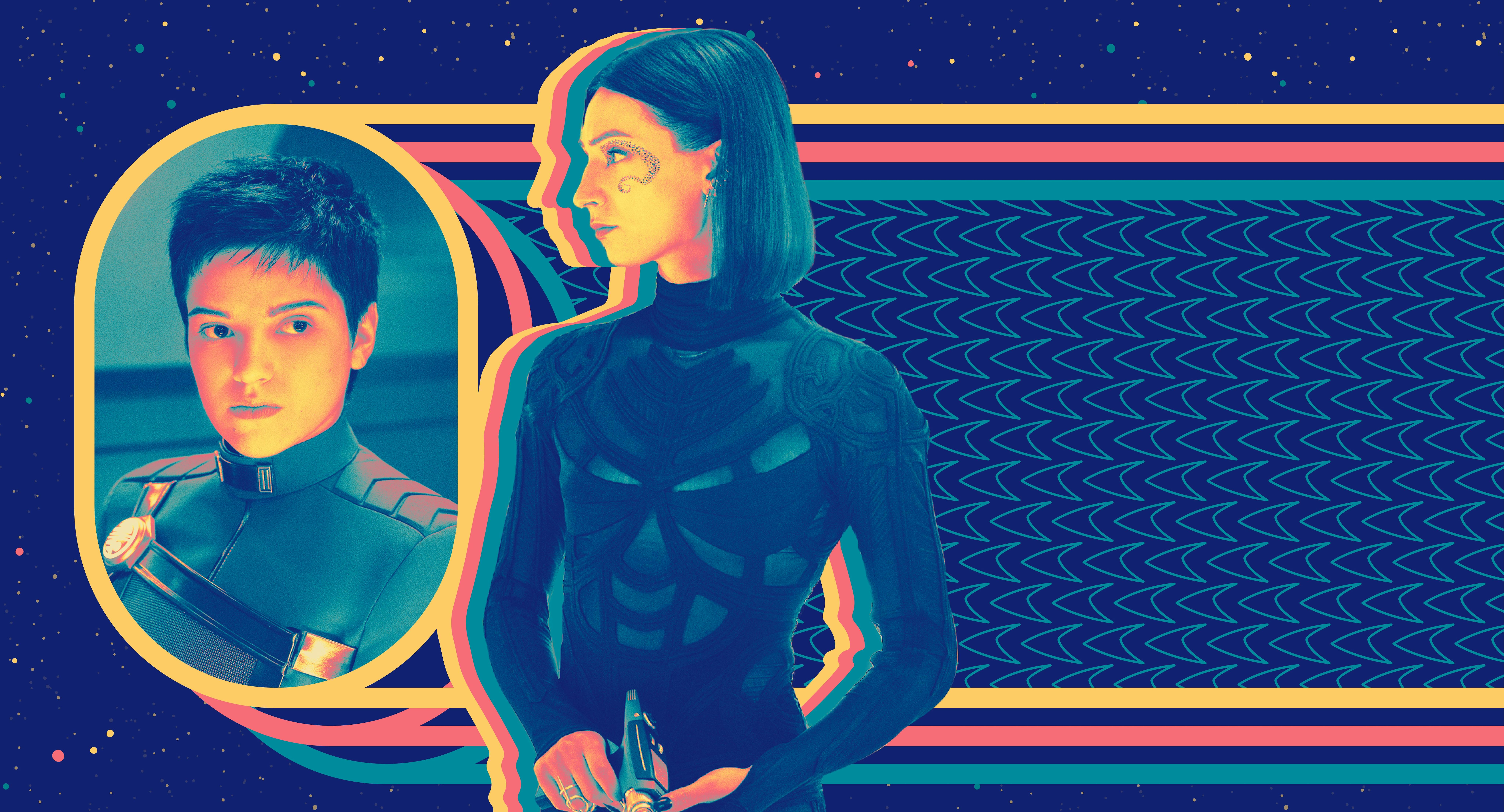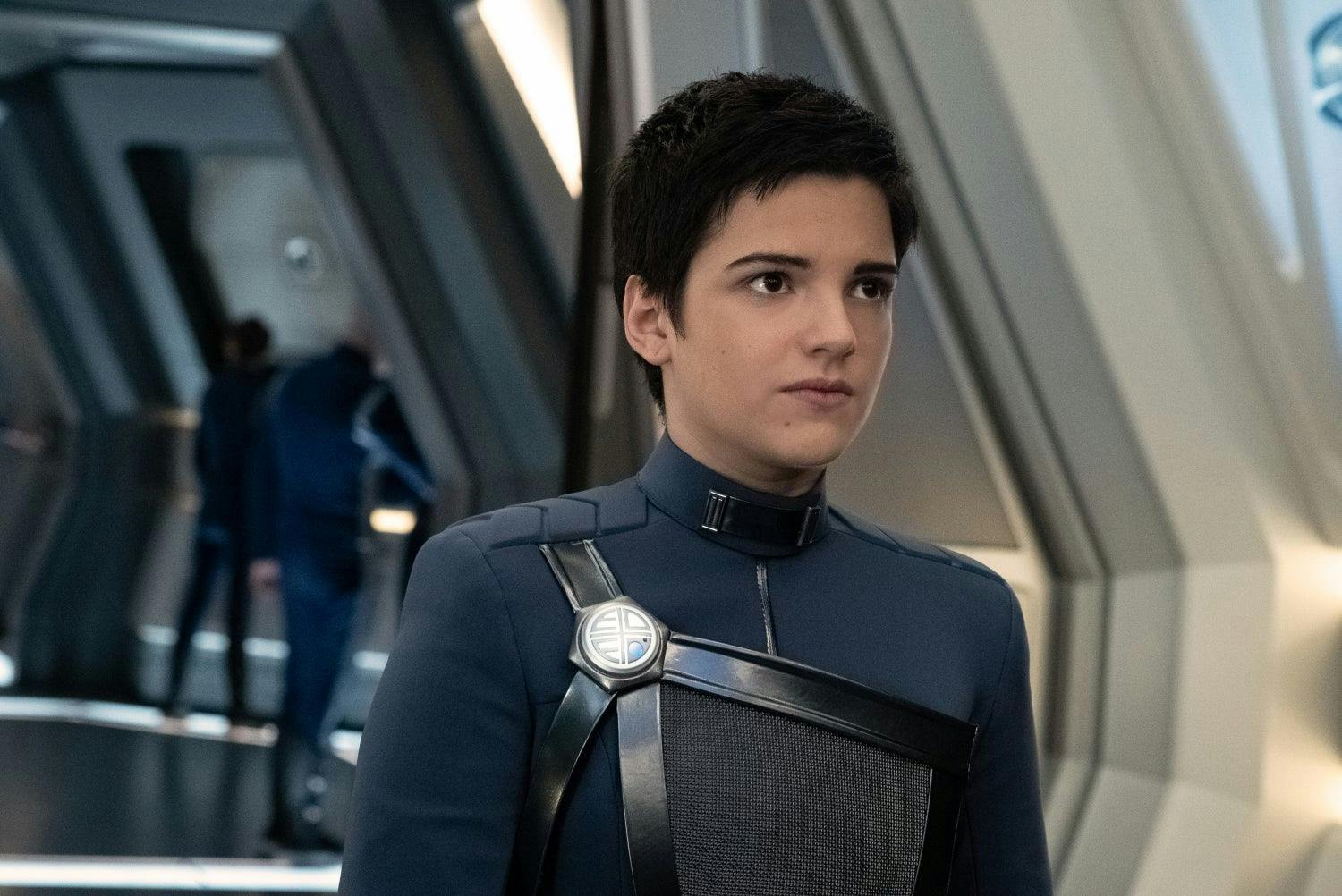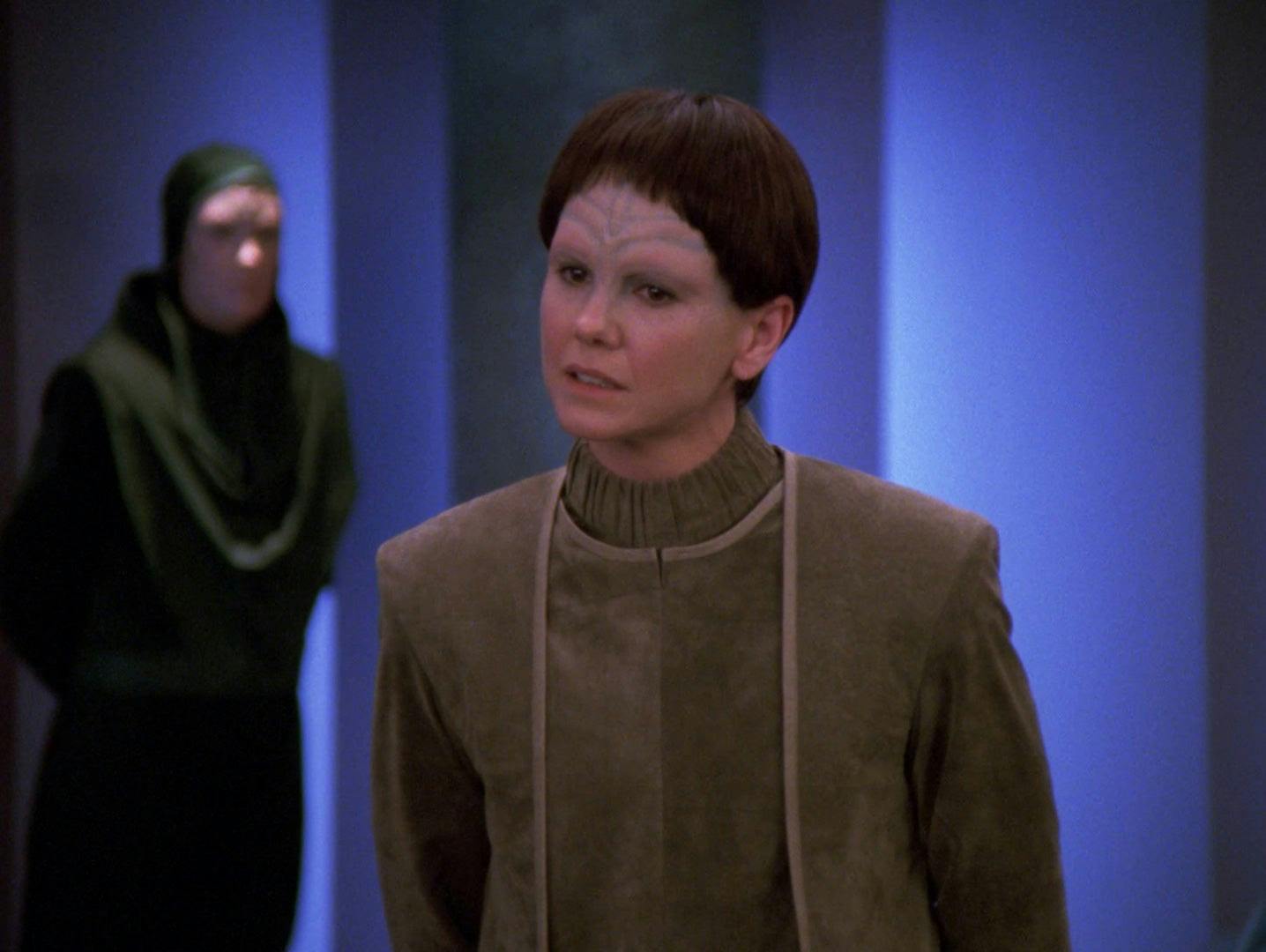Published Sep 8, 2022
How Star Trek Embraces Those Who Society Shuns
One fan explores the portrayal of non-binary identity representation in Strange New Worlds, Discovery, and The Next Generation.

StarTrek.com
Since its inception, Star Trek has taken on a hopeful view of the future while exploring the society of the present. In the early days when Star Trek: The Original Series was airing during the height of the Civil Rights movement and the beginnings of the Cold War, this socially progressive attitude meant exploring race and nationality. In the present, this approach means exploring gender identity and sexuality, most recently seen in the Star Trek: Strange New Worlds and the episode "The Serene Squall.” As a non-binary person, "The Serene Squall” means a lot to me. In the episode, non-binary actress Jesse James Keitel appears as Dr. Aspen, a character with they/them pronouns and it isn't treated as a big deal.

StarTrek.com
At no point is the character openly introduced as being non-binary, or made to say their pronouns. All of the other characters already know them and use them correctly. For me, personally, seeing my gender being represented on-screen without it being their sole reason to be on-screen is huge. It gave me a feeling of inclusion, and renewed my sense of hope for the future that Star Trek is so famous for. Interestingly though, "The Serene Squall” still explores non-binary gender identity, in an indirect way, through a beloved established character. Aspen uses Spock's heritage as a half-human, half-Vulcan to illustrate how all species “put things into boxes.” How we're either “this or that,” and how we work to fit other people's expectations. Yet Aspen makes clear that those boxes are not “necessarily who we are.” Spock asks, “If I am not human or Vulcan, what am I?” Aspen replies, “That isn't my question to answer.” In the context of the episode, we learn later that Aspen is trying to manipulate Spock into being on their side. Before that revelation, however, this exchange stands as the best 'explanation' of non-binary identity I've seen in media. So many people, myself included, experience gender dysphoria and can't find a box we fit in. I was already in my late twenties when I was finally introduced to the concept of non-binary and found “a box” I fit into. Yet non-binary identities have existed forever, it's just a lack of representation in popular art that makes them harder to see.

StarTrek.com
Ahead of the curve as it so often has been, "The Serene Squall” was not the first time Star Trek had explored non-binary identity. Before this, Star Trek: Discovery had introduced the franchise’s first non-binary main character, Adira. The representation is handled a little differently here; perhaps because they were destined to be a main character. Introduced in the third episode of Season 3, ”People of Earth,” the rest of the characters constantly refer to Adira with she/her pronouns. I admit this approach confused me when it aired as I knew that the actor portraying the character, Blu del Barrio, is non-binary and uses they/them pronouns. I started to think that perhaps the show runners had simply cast them as a cis woman; this was not the case. A few episodes later, in “Scavengers,” Star Trek did what it does best and explored a contemporary social issue – it acknowledges misgendering Adira, and demonstrates how hard it can be to come out. While I celebrate "The Serene Squall” for not needing a moment like this, "Scavengers” handling of it brilliantly encapsulates that sense of hope Star Trek aims to deliver. The concept of misgendering someone, or being corrected about which pronouns to use, is a source of heated debate among certain groups online. For trans and non-binary people, this “debate” causes a great deal of harm and continues to other and alienate us. Yet in Star Trek that isn't what happened. Adira corrects Stamets on his use of pronouns, and there is no argument and no debate. Stamets just goes on to use they/them pronouns for Adira after that. To paraphrase a meme, “this is the future we want.” A world where simply correcting a pronoun isn't met with hostility or embarrassment. Everyone simply adjusts and moves on and gets on fine. What also helps "Scavengers” to stand out is the moment that Adira comes out to Stamets. They are clearly nervous and have to build up to saying something. We, as an audience, know that Stamets would never have argued back, criticized, or questioned them about it. Yet despite the trust that has built up between them, Adira is still shy to share it. I personally love that the episode does this. No matter your comfort level with a person, no matter how friendly the environment around you is, coming out is always going to feel like a huge deal. When I first came out to my wife, the person I love the most in the world, intellectually, I knew that she would be fine with it. Emotionally, I was terrified. That Star Trek chose to treat it as such an important moment to Adira shows that the writers and creators understand and care. It allows us to feel seen and understood, and again, represented in a way we've rarely (if ever) been represented before on TV.

StarTrek.com
Of course, Star Trek explored gender before this new era too. In Star Trek: The Next Generation episode "The Outcast,” the crew of the Enterprise encounter an entire planet of genderless aliens called the J'naii. In their society, it is considered criminal to identify as either male or female; although, we learn that many people do so in secret on the planet. Although the episode is imperfect, and even a little outdated now, it still feels like a decent exploration of trans identities. By making the concept of binary gender the unusual on this world, it forces the audience to acknowledge that treating non-binary and transgender as the unusual on ours is equally cruel. In a fan-favorite TNG episode, "The Offspring,” there is a small (but important) moment that is celebrated by the non-binary and trans community of fans. The episode is infamous for its introduction of Data's daughter, Lal. The moment comes when Data is asked about the offspring’s gender, and Data simply says he will allow Lal to decide and choose for themselves. This concept of self-determination, of being the only one who can understand ourselves enough to know our gender, is vital to non-binary and trans people. That Data understands and encourages this makes him possibly the best parent in Star Trek.

StarTrek.com
Overall, Star Trek has always been taking huge steps forward to explore what makes us all different, but human at the same time. Non-binary and trans people are included in that, whether it be in subtle little conversations between characters, or huge revelations. Star Trek: Discovery and Star Trek: Strange New Worlds have taken bold steps to be more inclusive and welcoming. It gives us a beacon of hope in what feels like a dark time for all of us, and I can't wait to see where that light leads to next.
David Haddon (they/them) is a British non-binary person living in America. They are a writer, photographer, and excitable nerd. You can follow them on Twitter @ebonrook_film.
Star Trek: Strange New Worlds streams exclusively on Paramount+ in the U.S., Latin America, Australia, the United Kingdom, South Korea, & the Nordics. The series airs on Bell Media’s CTV Sci-Fi Channel & streams on Crave in Canada with additional international availability to be announced at a later date. The series is distributed by Paramount Global Content Distribution.
Star Trek: Discovery currently streams exclusively on Paramount+ in the U.S. Internationally, the series is available on Paramount+ in Australia, Latin America and the Nordics, and on Pluto TV in Austria, France, Germany, Italy, Spain, Switzerland and the United Kingdom on the Pluto TV Sci-Fi channel. In Canada, it airs on Bell Media’s CTV Sci-Fi Channel and streams on Crave. Star Trek: Discovery is distributed by Paramount Global Distribution Group.
Stay tuned to StarTrek.com for more details! And be sure to follow @StarTrek on Facebook, Twitter, and Instagram.
